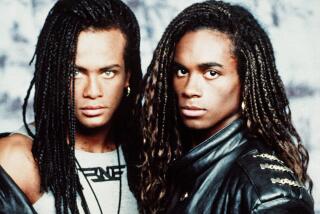Schuur and smooth for Manilow
- Share via
Look out, here come the jazz police: Barry Manilow is producing a jazz album. For the past few weeks, the pop megastar has been busily working in the studio with singer Diane Schuur, producing a CD of all-Manilow originals positioned in what he insists is a pure jazz setting.
The venture began after Manilow joined the Concord record label. “I took a look at their roster,” he says, “and they have some true musicians on the label -- the real stuff -- and Diane Schuur was one of them. They said that if I ever felt like producing anyone, to just pick through the roster. Well, Diane’s like our Ella Fitzgerald, so I called her, told her I’d love to produce her, and she said, ‘Let’s go.’ ”
Manilow is quick to add that producing is not exactly a new activity for him.
“I’ve always loved it,” he says. “I did Dionne Warwick’s ‘Dionne,’ with ‘I’ll Never Love This Way Again’ on it, and I did Bette Midler’s first two albums and Nancy Wilson’s ‘With My Lover Beside Me.’ And I’ve always co-produced my own stuff, forever.
Nor has Manilow been completely detached from the jazz world in a career in which he notes, with a laugh, that he started out as a cocktail pianist. But it wasn’t until he had become well established as a multimillion-selling pop artist that he decided to take a flier in an entirely different area.
“I bit the bullet in 1984,” he recalls, “and told Clive Davis that I’d run out of pop ideas.
“So I put together this album called ‘2:00 A.M. Paradise Cafe’ and I called Gerry Mulligan and Mel Torme and Sarah Vaughan -- all these dynamite, legendary musicians and singers -- and they all joined me on this original album. I wrote everything on it -- a kind of 12-song, 45-minute suite. I was the soloist on it, and I don’t think I sounded half bad. Certainly I sounded totally different from the guy who sang ‘Ready to Take a Chance.’ And I got some interesting reviews.”
Despite the “interesting” response, Manilow has pretty much been Manilow ever since. At least until his association with the jazz-drenched Concord label revived his jazz affections.
But working with Schuur, who has often been criticized for a tendency to use her obvious vocal skills and what might generously be described as a histrionic style, called for a careful approach to production.
“I guess [those sorts of histrionics] come from being on the road so much,” he says, “because audiences flip out when you do that kind of thing. Then, when you do it in the studio, the musicians and the producer flip out too. But when you take it home, it’s just too overwhelming for your stereo system. The truth is that recording is not the same as live performance. There’s a whole different art to making a record.
Manilow and his songwriting associates spent a year writing the material for the album, which also features a version of “When October Comes,” one of a group of songs written to Johnny Mercer poems offered to Manilow by the great lyricist’s widow. But it took some sorting out to find the appropriate jazz focus. Initially some consideration was given to smooth jazz -- but not for long.
“We talked about it,” he says. “Smooth jazz, contemporary jazz, boring jazz. It used to be great, but now it’s become, I don’t know, bland or something. And I didn’t want to put her in something like that.”
Manilow felt far more comfortable with a much earlier genre.
“The era that I always go back to in the world of music and jazz, especially,” he explains, “is the ‘50s. For my taste, that’s when they were really being inventive.”
Toward that end, Manilow brought in players such as Peter Erskine, Alan Broadbent, Chuck Berghofer and Warren Luening, with singer Karrin Allyson chipping in for a duet on one number with Schuur.
Will Manilow wear more than a producer’s cap and move into the studio himself for some musical participation in the album, which is scheduled for release in the spring? “Oh, man,” he says, “the problem is that the jazz police would really come down on that. Because this is a true jazz album, and I’m not. My singing is not true jazz singing. I love it, I can produce it, I can write it. But when I try singing it, I sound like Pat Boone. It just doesn’t want to come out right.”
Still, it wouldn’t be surprising if Concord decided to crank up the heat for at least a token Manilow appearance.
More to Read
The biggest entertainment stories
Get our big stories about Hollywood, film, television, music, arts, culture and more right in your inbox as soon as they publish.
You may occasionally receive promotional content from the Los Angeles Times.









